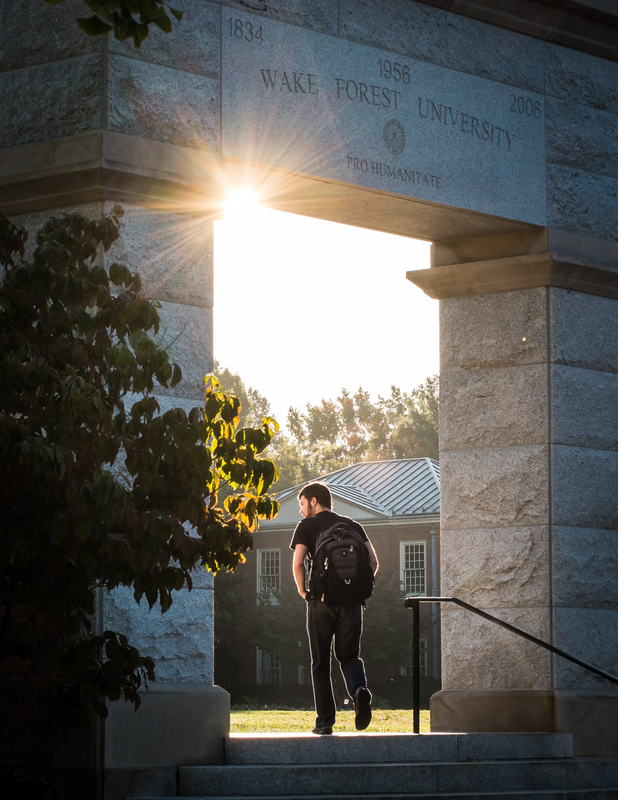About Wake Forest College
Wake Forest College began as a manual labor institute in 1834, with an initial class of just 16 young men. Today, more than 5,400 undergraduates and more than 480 premier teacher-scholars comprise the cornerstone of our collegiate university, Wake Forest College. Wake Forest remains dedicated to maintaining the highest standards of education and to preparing our students for life in a challenging, global environment.
Vision of Wake Forest College
Wake Forest College of Arts and Sciences aspires to be a vital and engaging community of learning that:
- Combines the pedagogical intimacy of a liberal arts college with the academic vitality of an internationally recognized research institution;
- Emphasizes exceptional teaching, discovery, and student/faculty engagement within a dynamic academic community;
- Fosters the discussion of ideas and issues, modes of expression, and artistic and cultural exchange;
- Attracts a diverse community of the brightest scholars and students from throughout the country and the world;
- Encourages international education and experiences for its students and faculty;
- Links intellectual curiosity with philosophical reflection, ethical deliberation, and a commitment to service.
Mission of Wake Forest College
Wake Forest College stands as the cornerstone of Wake Forest University. It is a distinctive academic institution that values and maintains the liberal arts tradition within the context of an internationally recognized research university. The College embraces the teacher-scholar ideal, valuing exceptional teaching; a commitment to outstanding and innovative research, discovery, performance, and creative activities; and personal academic interaction between students and faculty both in and out of the classroom.
The College honors the ideals of liberal arts learning, which encourages habits of mind that ask “why,” that evaluate evidence, that are open to new ideas, that attempt to understand and appreciate the perspectives of others, that accept complexity and grapple with it, that admit error, and that pursue truth. Liberal arts education also entails commitment to teaching the modes of learning in the basic disciplines of human knowledge; advancing the frontiers of knowledge through in-depth and interdisciplinary study and research; transmitting cultural heritages; developing critical appreciation of moral, ethical, aesthetic, and religious values; and using knowledge in the service of humanity. The College believes in the development of the whole person and is committed to sustaining an environment where beliefs, assumptions, and ideas are examined thoughtfully and critically in a climate of academic freedom.
The College embraces the challenges of cultural diversity and pluralism in all their forms and is committed to addressing these challenges through the cultivation of diverse learning communities that reflect the world in which students and faculty live. To fulfill the ideals of liberal arts education, Wake Forest students, staff and faculty must bring with them differences to be shared and explored. The College promotes a vibrant scholarly community and integrates academics into a broad-based program of intellectual engagement with community service and extracurricular activities.
The Office of the Dean of the College is committed to supporting all faculty, staff, and students in their development of, and engagement with, academic departments and programs that offer robust curricula taught in inclusive environments. We know that our students are entering a profoundly diverse world, and our dedication to Inclusive Excellence enables them to do so as the leaders and citizens we need now and in the future.
While Wake Forest College has attained a national presence and constituency, its sense of self is shaped by cultures that are distinctively southern and North Carolinian, cultures which value service. To this end, the College takes seriously its commitment to serve the community and region wherein it resides and endeavors to expand its awareness and extend its influence by emphasizing international study and international understanding. The College strives to be a dynamic and diverse learning community, valuing knowledge, experience, and service for the benefit of humanity, thus preparing students to be active and informed members of the world in which they live.
History of the College
Wake Forest Institute was founded in 1834 and opened its doors on February 3 with Dr. Samuel Wait as principal. Classes were first held in a farmhouse in Wake County, North Carolina, near which the village of Wake Forest later developed. It was re-chartered in 1838 as Wake Forest College. Today, Wake Forest College, located in Winston-Salem N.C., is the undergraduate liberal arts and sciences school of Wake Forest University. The College is the cornerstone of the University’s academic life; through it, the University carries on the tradition of preparing men and women for personal enrichment, enlightened citizenship, and professional life.
For more than a century and a half, Wake Forest College has been educating students in the fundamental fields of human knowledge and achievement. It seeks to encourage habits of the mind that ask “why,” that evaluate evidence, that are open to new ideas, that attempt to understand and appreciate the perspectives of others, that accept complexity and grapple with it, that admit error, and that pursue truth.

The Academic Experience at Wake Forest College
- Applicants for first-year admission: 19,600
- Freshmen accepted/enrolled: 4,068/1,544
- Total undergraduate enrollment: 5,595
- Faculty to Student Ratio: 1:10
Data for the Fall 2025 Semester

